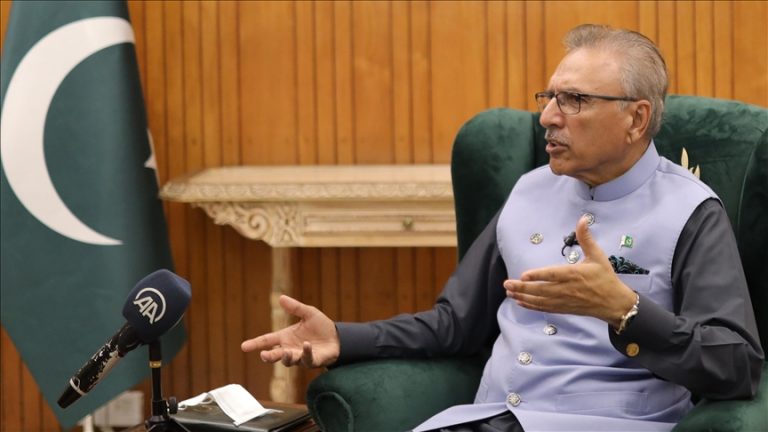
Arif Alvi’s overstay is the result of delay in holding general elections, originally scheduled for November but are now likely to be held in February
Aamir Latif
Karachi, Sindh Pakistan
Pakistani President Arif Alvi’s five-year term expired on Friday evening amid simmering political and economic crises. He is the fourth president to complete a full five-year term in office.
Alvi, who was elected the 13th president of the South Asian country in September 2018 following the election victory of the Pakistan Tehreek-e-Insaf (PTI) party led by ousted Prime Minister Imran Khan, will continue to serve until next year’s presidential election.
His overstay is the result of a delay in the holding of general elections, which were originally scheduled for November but are now likely to be held in February.
Alvi dissolved the lower house of parliament, or the National Assembly, on Aug. 9, only three days before the expiry of its five-year term, on the advice of outgoing Prime Minister Shehbaz Sharif, paving the way for the national vote within 90 days.
According to the constitution, if parliament completes its term, elections have to be held within the next 60 days.
If, however, the National Assembly or the provincial assemblies are dissolved even a single day before that, polls must be conducted within the next 90 days.
A week before the expiry of parliament’s term, the Council of Common Interests, a constitutional body that comprises the prime minister and the chief ministers of all provinces, approved the controversial results of a new nationwide census, making it almost certain that elections will not be held on schedule.
The hasty approval means the country’s top electoral body, the Election Commission of Pakistan (ECP), needs at least four additional months to notify new constituencies in the country in accordance with the latest census.
This means the elections cannot be held before February next year.
Electoral College incomplete
In Pakistan, a president is not elected through a direct vote but by the members of the upper and lower houses of parliament and the four provincial assemblies.
Currently, only the upper house — the Senate — is functioning, whereas the national and four provincial assemblies stand dysfunctional following the expiry of their respective terms.
In case of an incomplete electoral college, according to the Constitution, the outgoing president continues to serve until the election of his successor.
Pakistan follows a parliamentary form of government with the prime minister calling the shots.
The president, who is the country’s constitutional head and the commander-in-chief of the three armed forces, practically embodies a symbolic authority over state affairs.
Tumultuous stint
During his five-year stint, Alvi had to see his leader Imran Khan be put behind bars in a graft case, the toughest moment of his decades-long political life.
A dentist by profession, Alvi served with two governments — docile to one and hostile to the other.
His role was merely that of a factotum during the nearly four-year tenure of his leader, Imran Khan, as he restricted himself to presiding over conventional ceremonies and signing bills sent by parliament.
Alvi and his father had a long association with Jamaat-e-Islami
However, he appeared to be proactive after the ouster of Khan through a no-trust vote in April 2022, giving the Sharif government a tough time.
He took on the previous regime from the very first day, when he refused to administer the oath to Sharif.
The latest controversy he found himself in was legislation last month that according to him he did not sign and yet became law.
The legislation, involving two bills – the Official Secrets Act Amendment Bill 2023 and the Pakistan Army Amendment Bill 2023 – which give authorities more power to prosecute people for acts against the state and military, was approved by parliament in July and August.
He remained vocal against the registration of a host of cases against the jailed former premier following his ouster.
Alvi, who is among the founding members of the PTI, had had a long association with Jamaat-e-Islami, a mainstream religious party in the country.
His father, Habib-ur-Rehman Elahi Alvi, was also a close aide of Jamaat-e-Islami founder and renowned scholar of the sub-continent Syed Abul Ala Maududi.
He has four children who are all married.
“I enjoy life with (my) grandchildren tremendously and consider them as one of (the) greatest joys and pleasures of my life,” Alvi wrote on his website.
_______________